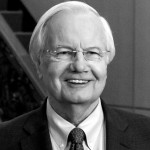Let that sink in: The United States "risks calcifying into a European-style, class-based society."
In 1960 I heard John F. Kennedy promise that "a rising tide lifts all boats." He was right then. He would be wrong today. Just this past weekend The Washington Post, in a lead editorial, called for a second look at the old belief "that anyone who works hard and plays by the rules can attain the American dream by sharing in the fruits of economic progress." As great wealth accumulated at the top, the rest of the country is not benefiting proportionally. Across the country working men and women are strained to cope with the rising cost of health care, pharmaceutical drugs, housing, higher education, and public transportation - all of which have risen faster than typical family income. The economist Robert J. Gordon, quoted in The Financial Times (another pro-business publication), says there has been "little long-term change in workers share of U.S. income over the past half century." The top ten percent of earners have captured almost half the total income gains and the top one percent has gained the most of all - more in fact, than all the bottom 50 percent.
We are witnessing a marked turn of events for a nation whose DNA contains the inherent promise of an equal opportunity at "Life, Liberty, and the pursuit of Happiness." We were not supposed to be a country where the winners take all. The great progressive struggles in our history were waged to make sure ordinary citizens, and not just the rich, share in the benefits of a free society. Today, however, the majority of Americans may support such broad social goals as affordable medical coverage for all, decent wages for working people, safe working conditions, a good education for every child, and clean air and water, but there's no government "of, by, and for the people" to deliver on those aspirations. America is no longer working for all Americans.
Their economic strategy was to cut workforces and wages, scour the globe for even cheaper labor, and relieve investors of any responsibility for the cost of society. On the weekend before President Bush's second inauguration, The New York Times described how his first round of tax cuts had already brought our tax code closer to a system under which income on wealth would not be taxed at all and public expenditures would be raised exclusively from salaries and wages.
Their political strategy was to neutralize the independent media, create their own propaganda machine with a partisan press, and flood their coffers with rivers of money from those who stand to benefit from the transfer of public resources to elite control. Along the way they would burden the nation with structural deficits that will last until our children's children are ready to retire, systematically stripping government of its capacity, over time, to do little more than wage war and reward privilege.
Their religious strategy was to fuse ideology and theology into a worldview freed of the impurities of compromise, claim for America the status of God's favored among nations (and therefore beyond political critique or challenge), and demonize their opponents as ungodly and immoral.
At the intersection of these three strategies was money: Big Money.
They found a deep flaw in our political system and zeroed in on it.
Our elected officials need huge sums of money to finance their campaigns, especially to buy television. The average cost of running and winning a seat in the House of Representatives - the so-called "People's House" - now tops one million dollars. The chairman of the Federal Election Commission said just this weekend that anyone who expects to run for the nomination for president - the nomination - in 2008 will need to have raised one hundred million dollars by the end of 2007. That money isn't going to come from regular folks - less than one half of one percent of all Americans made a contribution of $200 or more to a federal candidate in 2004. No, the men and women who have mastered the money game have taken advantage of this fundamental weakness in our system - the high cost of campaigns - to sell democracy to the highest bidder.
Some simple facts:
The number of lobbyists registered to do business in Washington has more than doubled in the last five years. That's 16,342 lobbyists in 2000 to 34,785 last year. Sixty-five lobbyists for every member of Congress.
The total spent per month by special interests wining, dining, and seducing federal officials is now nearly $200 million. Per month.
But it's a small investment on the return. Just look at the most important legislation passed by Congress in the last decade.
There was the energy bill that gave oil companies huge tax breaks at the same time that Exxon Mobil just posted $36 billion in profits in 2005, while our gasoline and home heating bills are at an all-time high.
(Note: You can view every article as one long page if you sign up as an Advocate Member, or higher).





